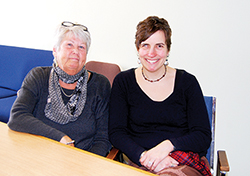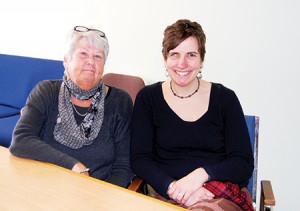

copyright the Chronicle March 11, 2015
by Tena Starr
NEWPORT — Erica Page always thought she was meant to be a foster parent. After years of unsuccessfully trying to have children of their own, she finally told her husband, Shaun Sykes, “Enough is enough. Let’s become parents in a different way.”
In May, Ms. Page and Mr. Sykes got their first placement, a boy, who is now four. They also have a four-month-old girl in their home.
“I’m their mom,” Ms. Page said. “It’s as if they’ve been mine since birth.”
But fostering children is not easy, or simple. It’s not for the excitable, or those who are looking for gratitude.
“Some of these children face a whole host of problems,” Ms. Page said. “Some feel they need to take care of their younger siblings. Drugs are so prevalent. There are babies born addicted. There are kids four and six years old being home alone. They don’t know how to be children. I know of a kid who would get up in the middle of the night and try to make meals.”
“It’s exhausting, it’s mentally taxing, and it’s so rewarding,” Ms. Page said. “We feel like the lucky ones. These are my kids.”
For its part, Newport District Family Services feels lucky to have people like Ms. Page and Mr. Sykes. The area is badly in need of foster homes. Currently, Newport District Family Services has 52 children in its custody.
That’s not the most there have been in terms of numbers, said Director Suzanne Shibley. But it is a 25 percent increase over last year.
“We’re in need of more foster homes for all ages,” Ms. Shibley said. “We’re really getting nervous. If another kid comes into custody where are we going to put them?”
Family Services is so badly in need of new foster homes that its employees are out in the community actively recruiting. Recently, they were at the Lions Tournament at Lake Region Union High School, for instance.
Not only has the caseload increased, but also some longtime foster parents have aged out, said Newport Family Services Resource Coordinator Deb Richards, who’s spent years at the job. Some people have adopted children, she said, some have no room for more, some have tried being a foster parent and decided it’s not for them.
At the moment, 36 children in the area are in custody because they couldn’t safely remain in their homes. Most of those are under the age of ten. Ten older kids are in custody because they’re beyond the control of their parents. And six older juveniles are in custody and also on probation, Ms. Shibley said.
The kids in the latter category have committed a crime and might have to be in institutional care for a while, but the ultimate goal is to put them in a family setting.
And ideally, Family Services hopes to have them stay there.
“We don’t like to have children bouncing around from home to home,” Ms. Shibley said. Preferably, children remain in a single foster home, or at least remain in their school district. And Family Services tries very hard to keep siblings together.
That doesn’t always work. Ms. Page said her small boy has been in seven homes in his short life and expects everyone to say good-bye. Both children come from second-generation foster homes, she said.
“You hope you break that cycle. You hope the turmoil they have experienced, that we break that for them,” Ms. Page said.
“Every time a student changes schools, he or she loses about four to six months of educational progress,” Ms. Shibley said.
And high school students who change schools even once are less than half as likely to graduate as other students. Because of that research Family Services is looking not just for more foster homes, but also for a variety of homes all over the county.
“We’re really working hard at identifying foster parents in all the school districts,” Ms. Shibley said.
Historically, there have been more foster homes in the North Country school district, Ms. Richards added.
“Where we really lack is around the Lake Region area,” she said. “That’s the area where we’d like to have an increase.”
And it’s always good to have a pool of foster parents to choose from so the best possible matches can be made, Ms. Shibley said.
“Some want to foster just a boy or just a girl,” Ms. Richards said. “I don’t just call and say, I’ve got a kid, you’ve got a bed.”
Deb Randall has been a foster parent for 16 years.
“When my kids left home, I was lost,” she said. “I was a basket case.”
So she became a foster parent and has been doing it ever since. “I wish I’d been doing this right out of high school,” she said.
Sometimes it doesn’t work out. “There have been a few kids who I’ve said this isn’t going to work for me. I can tell with their attitudes. Some of them have been hurt so bad.”
She doesn’t take small children, and she doesn’t take girls.
“I usually take them about eight years old, and I just take boys.”
Over the nearly two decades that she’s foster parented, she’s noticed big differences, both good and bad.
“There’s a lot more help out there now than when I first started, like counselors,” Ms. Randall said. “All the schools deal with it so much better. They have the training.”
On the other hand, she said that she sees children who don’t want to do anything but play video games. In her house, playing video games is limited to an hour a day.
And like everyone else interviewed for this story, Ms. Randall said the prevalence of drugs has made a marked difference in the stability of the lives of children.
“I’ve had kids come into my home who would hoard food and would ask, are we going to have lunch? I’ve had kids who don’t really know how to go outside and play. They don’t know what to do.”
As much as Ms. Richards is anxious to recruit new foster parents, she warns that it’s not a job for everyone. In fact, if she gets a call from someone expressing interest, she recommends that person take training.
Family Services offers training classes twice a year to familiarize potential foster parents with the challenges they will face. The next training will start on Wednesday, March 18. All sessions are held at the Family Services office from 5:30 to 8:30 p.m. There will be an adoption class on April 29.
The training helps people figure out if they’re cut out to be a foster parent, Ms. Richards said. For instance, one family very much wanted to become a foster home but after training sessions sadly concluded they couldn’t.
“They called and said I can’t do this. It’s going to take a lot of time,” Ms. Richards said.
Ms. Page would relate to that. She said she’s fortunate enough to be able to stay home with the children. Sending her son to daycare five days a week wouldn’t do him any good, she believes. She and her husband plan to adopt their little boy — and hope to adopt the baby girl, although that may not work out for them.
And that’s another thing Ms. Richards warns against. “We are not an adoption agency,” she said.
“We can’t promise that you’ll be able to adopt,” Ms. Shibley said. “Couples who are struggling to have a child of their own are not in the right place.”
Ms. Page is well aware of that pitfall of foster parenting.
“You hope you never have to say good-bye,” she said. “You wear your heart on your sleeve doing this. There’s a huge potential for heartbreak.
“Your family goes into this with such guarded hearts. They say, I fell in love with her. What if she goes away? Well, if that happens, it does. We will mourn, we will cry. We didn’t go into this thinking it was going to be all peaches and cream.”
And it’s not. Some of the behavior would challenge any parent. And there are doctors’ appointments, school conferences, meetings….
“These children have been through a lot,” Ms. Shibley said. “They aren’t going to act like your own children.”
“And they’re not going to be thankful,” Ms. Richards added. “Why would they be?”
Ms. Shibley points to the Northeast Kingdom economy, what she calls a “very impoverished area,” when contemplating what accounts for the increased need for foster parents.
But the Northeast Kingdom has never been on the high end of prosperity.
“Drugs are huge,” Ms. Richards said flatly.
“At least 50 percent of our cases have some correlation with drug use and abuse,” Ms. Shibley said. “This is really something that has taken us by storm.”
Ms. Richards said she also believes that families are less settled than they were a generation ago. They move more often, have less of a support system, not so much extended family.
Not all children in precarious situations come into state custody, she added. First, there must be a report of neglect or abuse.
“If things don’t get reported, there’s nothing we can do,” Ms. Richards said.
“It’s not to say that we’re not concerned, it just may not meet the threshold,” Ms. Shibley said. “The most challenging situations are where the parents may not want assistance.”
After receiving a report, Family Services investigates to see if the report will be “substantiated.”
Children are not automatically removed from the home even if a report is substantiated. Instead, wherever possible, Family Services tries to work with families to improve the situation.
If there’s an imminent safety risk, however, Family Services goes to court where a judge decides what should happen.
“We have a lot more kids under the age of five coming in,” Ms. Richards said.
Family Services is also looking for people to do respite care, Ms. Richards said. That means taking a child for a few days to give other foster parents a break, much like a biological parent might send a child to visit grandparents for a weekend.
“I like to insist that foster parents take a weekend now and then,” Ms. Richards said. Foster parents receive what Ms. Shibley calls a “modest reimbursement” for taking in a child.
“So when people say, oh, they’re doing it for the money, it’s not that,” Ms. Richards said wryly.
“We do have some kids who have some pretty challenging behaviors, and we can provide additional support and a higher rate of payment,” Ms. Shibley added.
Ms. Page said she likes to keep in touch with children’s birth parents when possible.
“You want to do what you can for the parents, too,” she said.
She’s working on broadening the support network for foster parents, which is mainly each other.
“Until you live this, you don’t understand what it’s like,” Ms. Page said. “You can read every book, sit through every class.”
Flexibility, a sense of humor, and the support of other foster parents who have had many of the same experiences are all helpful in a job that can be challenging, but whose rewards are huge, she said.
For more information, contact Ms. Richards at the Newport District Office of Family Services.
contact Tena Starr at [email protected]
For more free articles from the Chronicle like this one, see our Editor’s Picks pages. For all the Chronicle’s stories, subscribe:
Print subscription
Annual online subscription
Short-term online subscription







